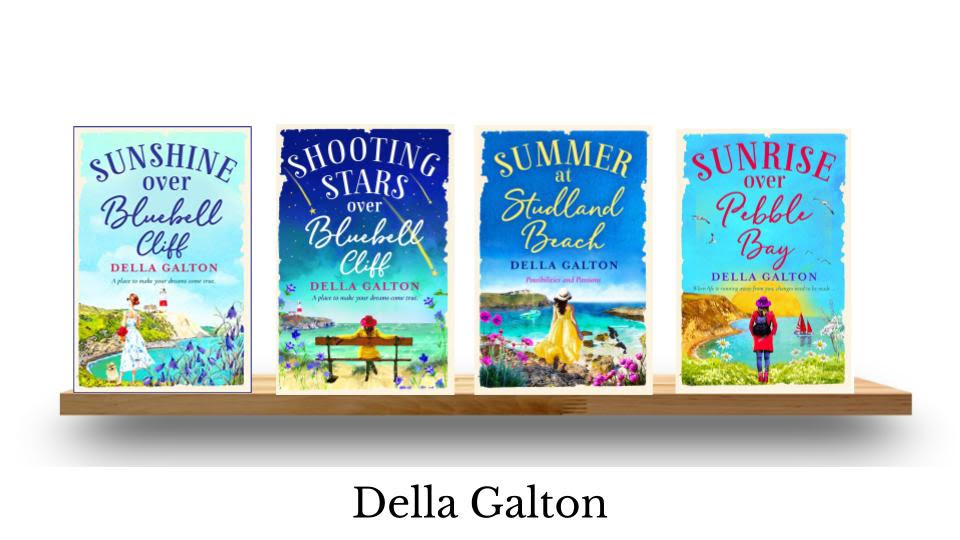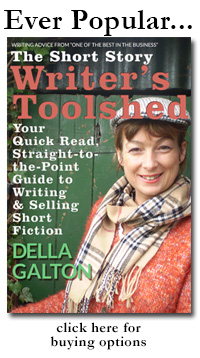As I think I may have mentioned (once or twice) I now have two Writer’s Toolshed books in existence. Apparently there has been some confusion and a few people think there is still only one. So in the interests of setting the record straight, no, there really are two. And to prove it here they both are side by side. (in the same room!)
The Short Story Writer’s Toolshed is about writing short stories. And The Novel Writer’s Toolshed is – oddly enough – about writing novels – BUT The Novel Writer’s Toolshed is for writers who usually write short stories. It would actually be just as useful for novelists who fancy writing short stories instead because it’s specifically about the differences between the two forms. Phew! That was complicated. Hope it makes sense?
Tell you what – why don’t I reproduce the beginning of The Novel Writer’s Toolshed here – just in case anyone would like to check it out. Here it is:
Short Stories Versus Novels What’s the Difference?
Making the transition between writing short stories and writing your first novel isn’t as simple as you might think. Or at least it wasn’t for me. I’d had a fair amount of success with my short stories and I didn’t think that writing a novel would present too much of a problem. Surely it was just a short story with more words, more characters and more plot, wasn’t it?
No doubt, some of you are already sniggering at my naivety, and I was naïve. I made a lot of mistakes before I managed to write a publishable novel. Many of them were down to assumptions I had that simply weren’t true.
Yes, there are similarities between the short story and the novel and yes many of the techniques used for one can be transferred successfully to the other, but there are an awful lot of differences too.
The object of this book is to help you avoid some of the mistakes I made. Let’s take a quick look at some of the differences before we go into more detail about what’s in the toolshed, and hopefully this will make your transition a little smoother than mine was!
Length
This is probably the most obvious difference. Not many short stories are longer than about 5,000 words and even a short novel is at least ten times longer than that. The average length for a novel – if there is such a thing – is somewhere between about 50,000 and 120,000 words, depending on the type of novel and the publisher’s requirements.
Unlike a short story, which can be written and edited in a few days, a novel is going to take a substantial amount of time and work, which brings me on to my next point nicely.
Subject
What you write is always a fairly important question – time is our most precious commodity – but it’s not quite as important when you’re choosing what your next short story is about. After all, writing a short story takes significantly less time than writing a novel. We can afford to experiment a bit more. However, if you are going to spend a great deal of your precious time and energy on your novel – which you will if you’re going to do it properly – then it isn’t a bad idea to choose something you are passionate about. There are two main reasons for this:
1) If you are enjoying the writing, you are more likely to finish it.
2) If you don’t end up selling it then at least you will have enjoyed its creation and hence won’t feel your time would have been better spent doing cross stitch or playing golf!
I have no idea of the statistics on unfinished novels, but I bet there are thousands of them, languishing in desks or on computers across the country. They are started in a flash of inspiration and then the author finds they peter out at around 27,000 words, or perhaps worse, are finished in 27,000 words.
The percentage of first novels that are published is also very small. I have heard various figures quoted, but I won’t depress you with them. Besides, who really knows? A great many writers don’t even send their first novels out to publishers and a great many more are told by their publishers that although this is the eighth book they’ve actually written, it will be marketed as their debut novel.
This is not intended to put you off, far from it. Write your novel, keep an eye on the market, but primarily do it for the love of it.
My first novel, incidentally, which was written when I was about twenty, is somewhere in our loft, along with the other three novels I wrote before I managed to write one that was publishable!
Right then, let’s have a quick look at what’s on each of the shelves, whist keeping the differences between short story and novel in mind.
Planning, plotting, pace and timescale
A short story plot, by its nature, needs to be kept fairly simple. There isn’t enough room for it to be complicated. Generally a short story will tend to focus on a single event or theme.
If you are writing several thousand words you will need a much more developed plot, or perhaps one main plot and some interlinking subplots to sustain the length. Whereas a short story can follow a single idea, longer fiction tends to need more than one.
There isn’t room to hang around too much in a novel either, but you do need to have a very good control of pace. Contrary to what I thought when I started my novel writing journey, there is no room for waffle. Every word must still count. For many short story writers, pace is the hardest thing to adjust to when they begin to write longer fiction.
Setting
Setting in a novel is much more important than it is in a short story. In certain types of novels, for example regional sagas, it is equally as important as character. I will cover setting in detail under Shelf Two. All I want to say here is that you need to show setting through the eyes of your viewpoint characters – do not paste it into your novel in blocks or your reader will probably skip it!
Characters and viewpoint
A short story of a thousand words almost certainly won’t have more than two or three characters, one of whom will be the main character. There is a lot more room for characters in a novel although that doesn’t mean you should attempt to have a cast of hundreds! You will still need to know whose story it is – this is perhaps even more important in a novel than a short story as it’s much easier to lose focus – and all of your characters must be essential.
In a short story there is often only room for one viewpoint. In a novel there is room for more. Using the viewpoint of more than one character can add a great deal of depth to a novel if done with skill.
Dialogue
In a short story your reader will probably forgive you if your characters don’t have recognisable and individual voices. In a novel, they probably won’t. So character voice is one of the most important things to work on in longer fiction.
The first page and beyond
It’s vital to get your first page right. It is just as vital not to get stuck on it. I have a personal theory that it’s difficult to write the first page of your novel until you’ve written the rest of it. When I’m writing a short story I find the ending is the most difficult part. When I’m writing a novel I find it’s the opposite. It’s easy to write the last page, but very difficult to write the first.
Development, author voice and endings
Developing a story is fairly easy. The middle follows on naturally from the beginning – and so it is with novels, only it’s much easier to end up with a saggy middle in a novel – this can be solved by careful control of pace and also, I think by strong author voice. Thankfully, while ending a short story is tricky, bringing a novel to a satisfactory conclusion is much easier.
Structure and flashback
How will you structure your novel? Deciding before you begin to write can help you to plan it. Structure is a short story writer’s friend, but it’s a novelist’s best friend because there are far more options.
Your novel might have a prologue. It might be split into parts and it will probably have chapters. You’re not limited to flashback. You can use flash forward too! It is great fun to play with time in a novel.
Editing and revision
The main difference between editing and revision of the two forms is time. A short story can be edited in a morning or an afternoon. A novel is much more unwieldy. Using a plan can help.
The Title, the synopsis, the blurb
A good title is always important, but it’s more vital for a novel than a short story, as it’s one of your key selling points. A great title can sell a novel. A bad one can cause it to sink without trace.
Most novelists I have spoken to hate writing a synopsis. This is something you rarely have to do for short stories but which is an essential part of a novelist’s job. Or is it?
These days it’s probably more important to be able to write a blurb. Has the synopsis taken over from the blurb? What’s the difference? On Shelf Nine you’ll find some examples of both.
Finding an Agent – Do you need one?
The short answer is no. You have never needed an agent for short stories and you don’t necessarily need an agent for novels either, these days, but is it worth going alone? If you do want to look for an agent or a publisher, Shelf Ten, will show you how to proceed.
So there you have it – a little taster of what the Novel Writer’s Toolshed is about.
if you would like to know more, do please check out The Novel Writer’s Toolshed which is available for Kindle £1.88 and in paperback £4.99.
The Short Story Writer’s Toolshed is currently available for Kindle £1.88. Paperback coming very soon.
And if you just fancy a bit of light reading (pun intended), Ten Weeks to Target, my new novella is available as a Kindle book too for just £1.53 🙂






Thanks for the useful advice
I reckon it’s the hat that’s confusing people. Is it your writer’s hat?
Tee hee – absolutely 🙂
Haven’t you got a writer’s hat then Patsy? 🙂